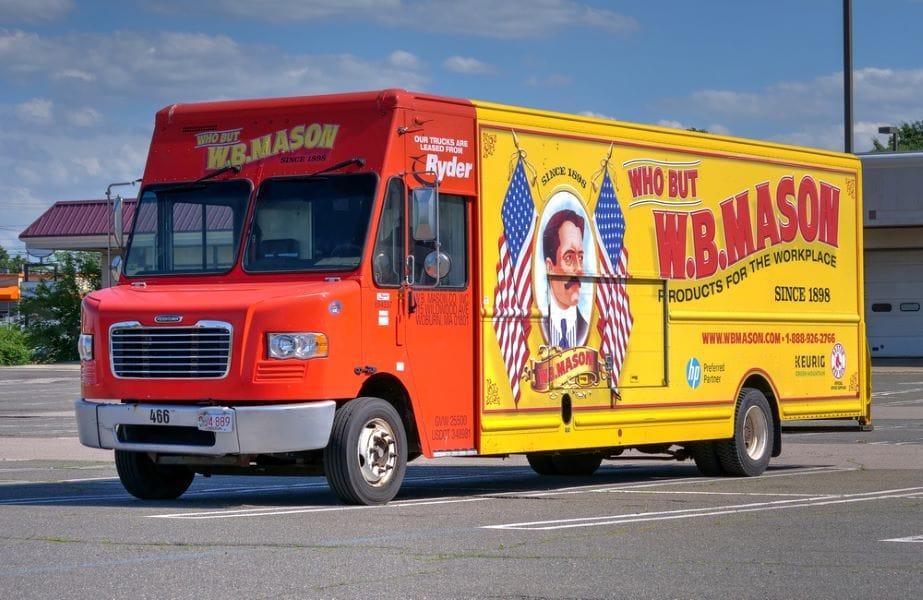The Origin of W.B. Mason: From Rubber Stamps to National Powerhouse
W.B. Mason, founded in 1898, grew from a small rubber stamp business into a major office products supplier. With over 60 distribution centers and $2 billion in annual sales, it thrives through personalized service and adaptability in the modern market.

W.B. Mason is the largest privately-owned office products dealer in the U.S., with over 60 distribution centers and 1,000 delivery trucks serving more than 300,000 businesses nationwide. Known for its iconic delivery trucks and longstanding business model, W.B. Mason has grown from a small stamp and stencil company into a national player in the office supply and furniture markets.
The Founding of W.B. Mason
W.B. Mason was founded by William Betts Mason in 1898 in Brockton, Massachusetts. The company initially specialized in rubber stamps, brass plates, stencils, and other printing products. Brockton’s flourishing shoe industry at the time provided a fertile ground for business, and W.B. Mason quickly expanded its offerings to meet the growing demand for office supplies.
Born in Auckland, New Zealand in 1865, William Betts Mason immigrated to the U.S. in 1872 and eventually found his way into the printing industry. After gaining experience in local businesses, he established W.B. Mason, focusing on high-demand products like rubber stamps for the shoe industry. Mason ran the company until his death in 1912, at which point his wife, Marcena, took over operations.
The Mid-20th Century: Transition and Expansion
After Marcena Mason sold the company in the late 1920s, it was acquired by Samuel Kovner, a businessman who had started his career sweeping floors at W.B. Mason. Under Kovner’s leadership, the company reached $243,000 in sales and continued to grow.
In 1963, the company was passed down to Helen and Joseph Greene, Kovner’s daughter and son-in-law. The Greenes introduced furniture into the company’s product line, helping W.B. Mason reach nearly $1 million in sales by the early 1970s. Following Joseph Greene’s death, their son, Steve Greene, assumed leadership and invited top sales representatives Leo Meehan and Thomas Golden to join the ownership group. This new leadership team laid the groundwork for W.B. Mason’s dramatic growth in the coming decades.

The Modern Leadership of Leo Meehan
In 1993, Steve Greene appointed Leo Meehan as President and CEO, a move that would further propel W.B. Mason’s expansion. Meehan introduced a business model centered on personalized service, local distribution, and free delivery, which allowed the company to grow significantly in the competitive office supply market. By 2001, W.B. Mason had reached $247 million in sales. A decade later, the company achieved the milestone of $1 billion in annual revenue.
Meehan also spearheaded W.B. Mason’s entrance into national advertising, starting with a high-profile ad placement on the Green Monster at Fenway Park in 2003. This marked the beginning of W.B. Mason’s extensive partnerships with Major League Baseball, including sponsorships with the Boston Red Sox, New York Yankees, and Philadelphia Phillies.

Adapting to the Pandemic and New Challenges
W.B. Mason faced new challenges during the COVID-19 pandemic in 2020. With offices closed and employees working from home, the company had to pivot to delivering its office products to residences, something it had previously avoided due to logistics and costs. Despite these challenges, W.B. Mason debuted a consumer-facing website and continued to adapt to the changing marketplace. Though the company saw a reduction in workforce, it maintained revenue levels around $2 billion, demonstrating resilience in the face of the pandemic’s disruptions.
Competing in the Modern Marketplace
W.B. Mason’s ability to compete in the modern marketplace has been driven by its focus on customer intimacy, localized distribution, and adaptability. While other office supply chains have focused on scaling through consolidation and massive retail footprints, W.B. Mason’s strategy has centered on providing personalized solutions and maintaining a direct connection with customers.
The company's wide range of products and services—including office supplies, custom printing, janitorial supplies, furniture, and foodservice products—enables it to serve a diverse customer base, from small businesses to multinational corporations. In addition, its partnerships with major sports teams have helped raise brand awareness and cement its status as a national player in the industry.

Conclusion: A Legacy of Service and Growth
W.B. Mason’s journey from a small rubber stamp business in Brockton to a billion-dollar enterprise is a testament to its ability to adapt and grow. Today, the company remains a major force in the office supply industry, offering an extensive range of products and services with a focus on customer satisfaction and localized service.
For customers looking to make informed purchases, platforms like Spoken can help compare prices and find the best deals across multiple suppliers, ensuring that businesses get the value they need in a competitive market.
Quick facts
What does W.B. stand for Mason?
W.B. in W.B. Mason stands for William Betts, the name of the founder who started the company in the late 19th century.
What does W.B. Mason company do?
W.B. Mason is a business supplies and services company that provides office products, furniture, cleaning supplies, and more to businesses across the U.S.
What is the W.B. Mason controversy?
The W.B. Mason controversy primarily revolves around trademark disputes with other companies, including a notable case involving Dairy Queen over the use of the term 'Blizzard' for office products.
What did W.B. Mason do?
William Betts Mason founded the W.B. Mason company in 1898 as a printing business, which later expanded into office supplies and services.
What is the salary of W.B. Mason?
The salary at W.B. Mason varies by position, with delivery drivers, sales representatives, and management roles offering different compensation packages. However, detailed salary information is typically available through job postings or employment review sites like Glassdoor.

Geoff Abraham
Co-founder & President of Spoken
Geoff is the co-founder and President of Spoken. He is a Dad. He holds a BA from UT Austin (Plan II) and an MBA from Stanford. Geoff has built several successful businesses, including a bicycle taxi business in San Francisco which he ran for 10 years with his wife, Mimosa. He is an executive coach, and he actively invests in seed-stage startups via The Explorer Fund.
Read more